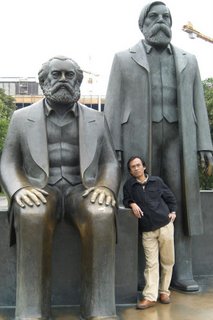 This prompted a revolution in Germany, which failed, and resulted in the emigration of a number of German liberals to America where they became known as the "Forty-Eighters."
This prompted a revolution in Germany, which failed, and resulted in the emigration of a number of German liberals to America where they became known as the "Forty-Eighters."Berlin also became the center of the social democratic movement, the worker's movement and the trade union movement in Germany.
It was the headquarters of the Social Democratic Workers Party, founded by Karl Liebknecht and August Bebel.
During World War I, a new militant leftist group formed by Jewish leaders, Karl Liebknecht and Rosa Luxemburg, agitated for the overthrow of the Kaiser and the end of the war.
The war effort was hampered when 300,000 workers went on strike in January 1918.
In November 1918 there was a naval mutiny and a strike of the dock workers.
Finally, on November 9, 1918, Philipp Scheidemann, the Jewish leader of the Social Democrats, proclaimed the first German Republic from a window of the Reichstag building in Berlin.
Twenty years later, the Nazis, who always blamed the Jews for Germany's defeat in World War I, got their revenge by starting the pogrom which became known as Kristallnacht on November 9, 1938.
30,000 Jewish men, many of them from Berlin, were rounded up and sent to the concentration camps at Dachau, Sachsenhausen and Buchenwald where they were held until their families could arrange for them to leave Germany.
foto hak cipta (c) Kean Wong. Tugu ini dikenali 'Marx-Engels Forum', di depan sebuah hotel baru Radisson SAS Berlin dan di kanannya, seberang terusan, gereja 'Berliner Dom'



No comments:
Post a Comment